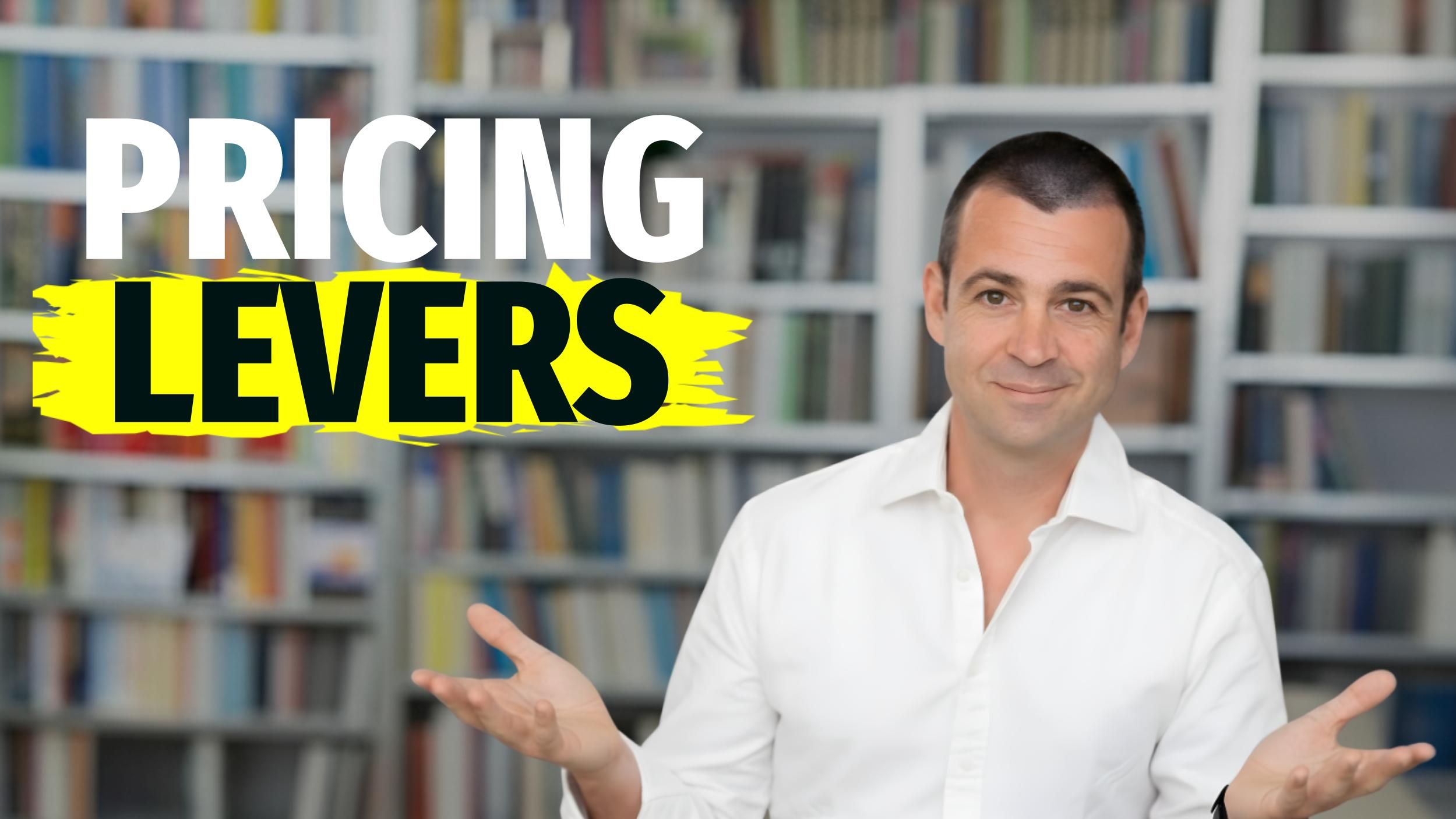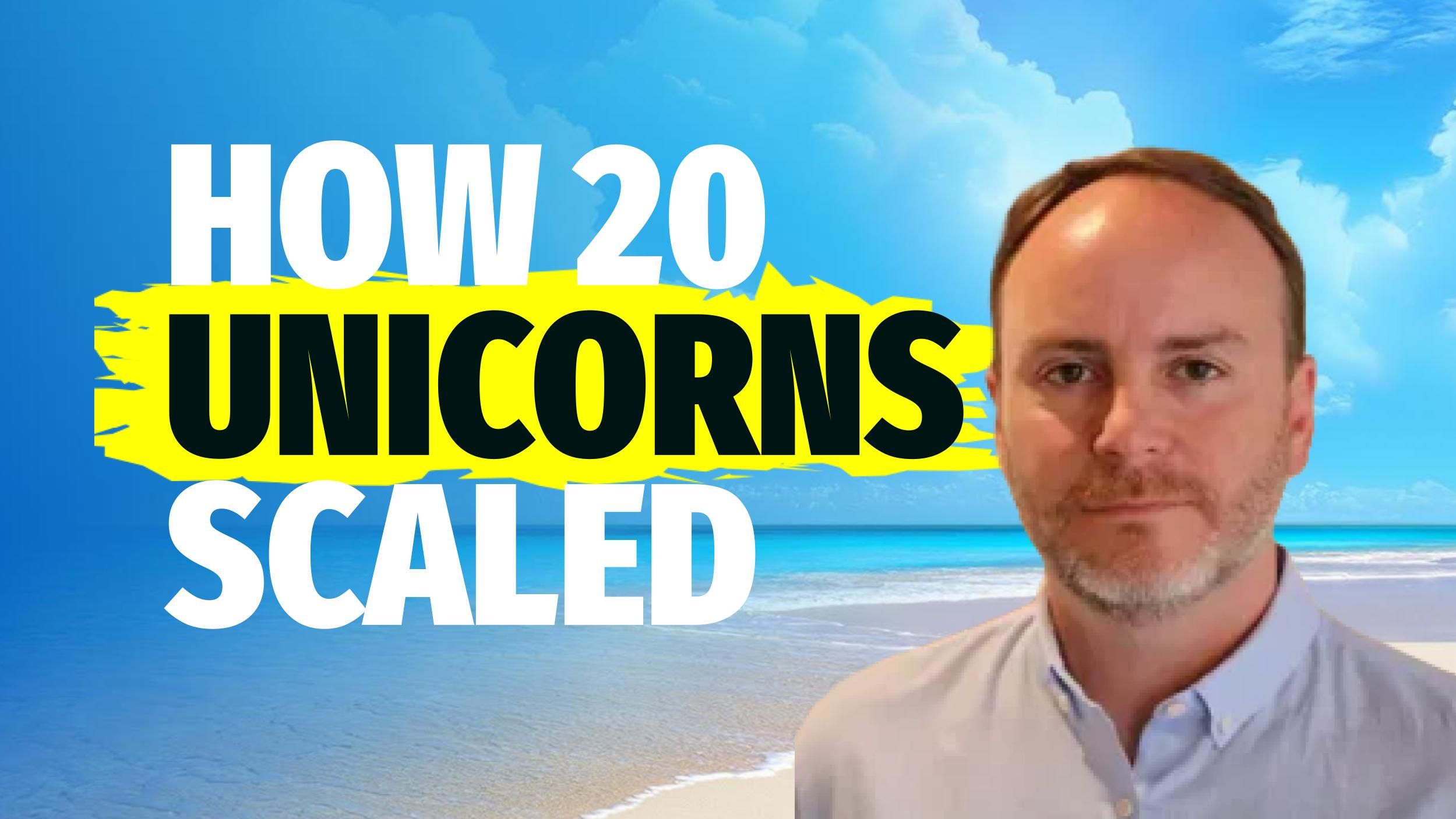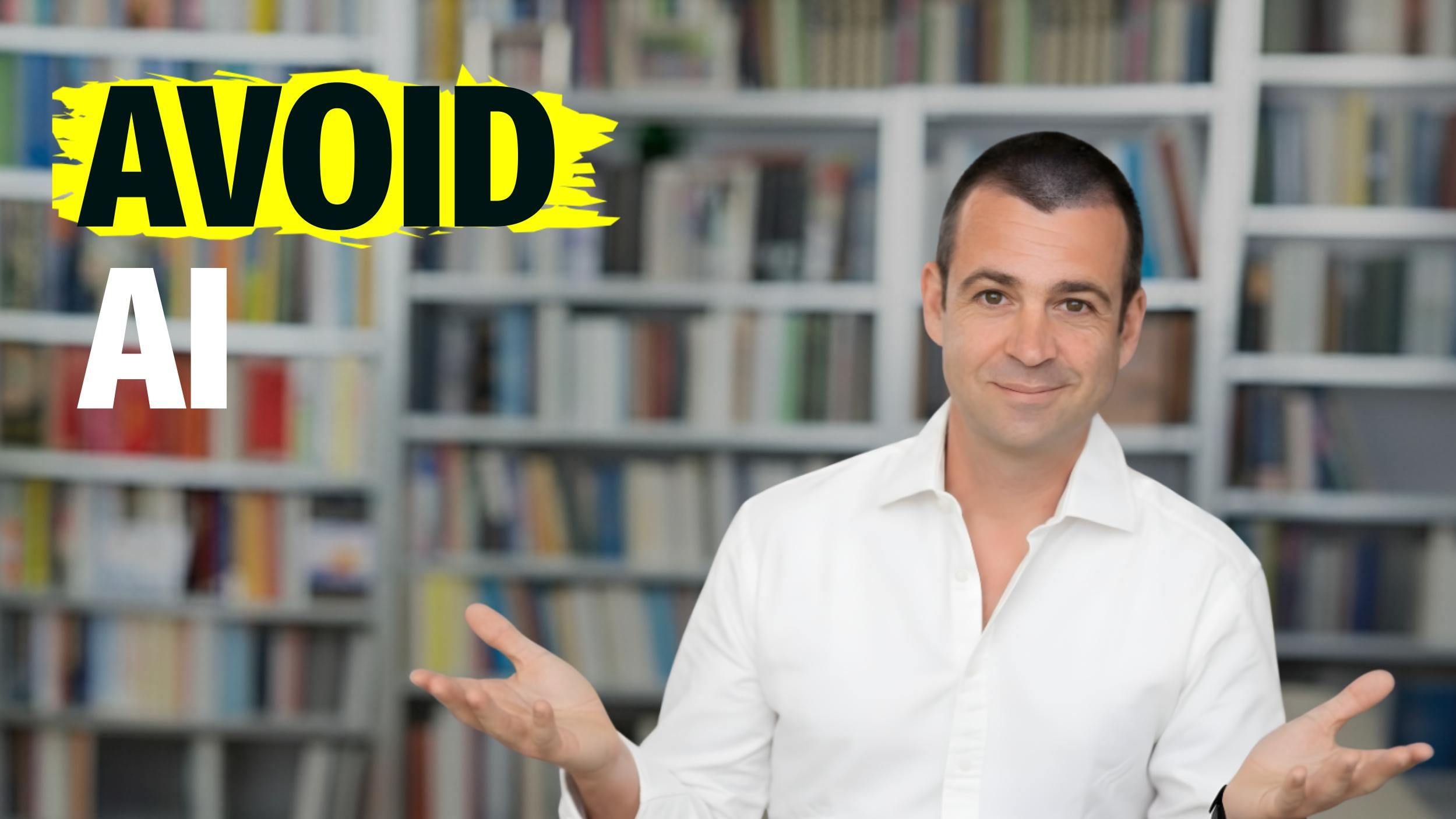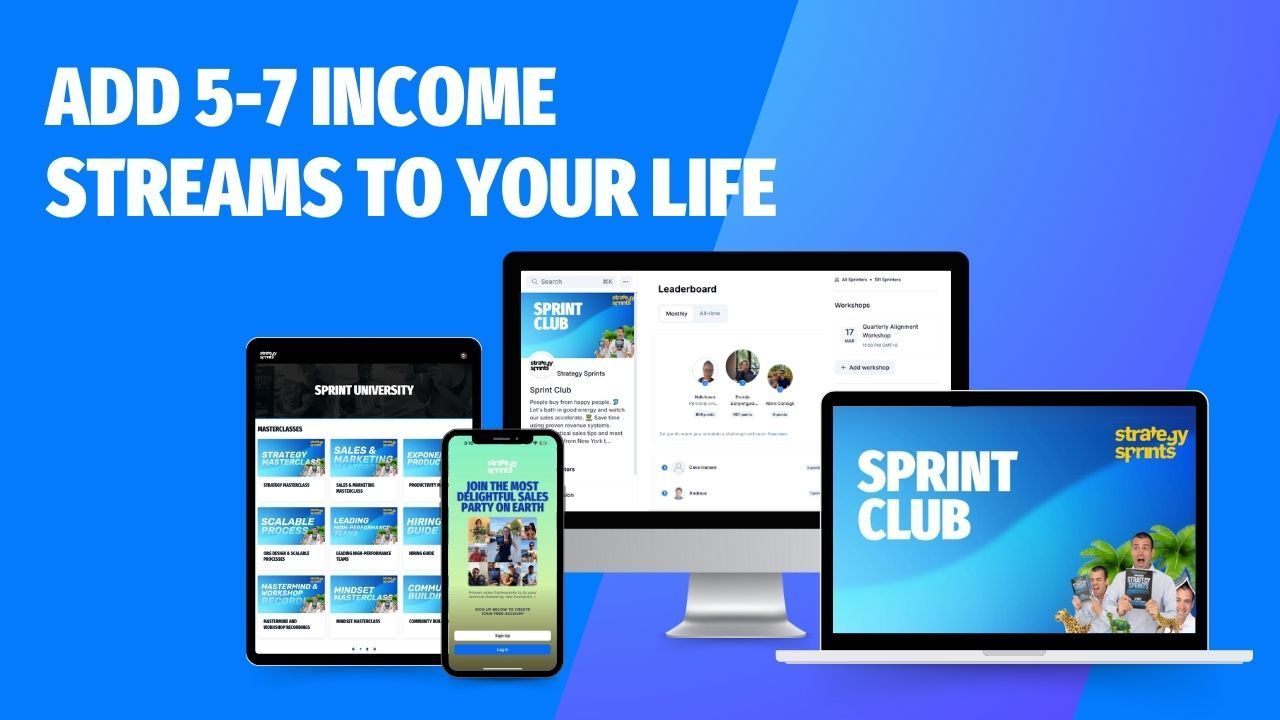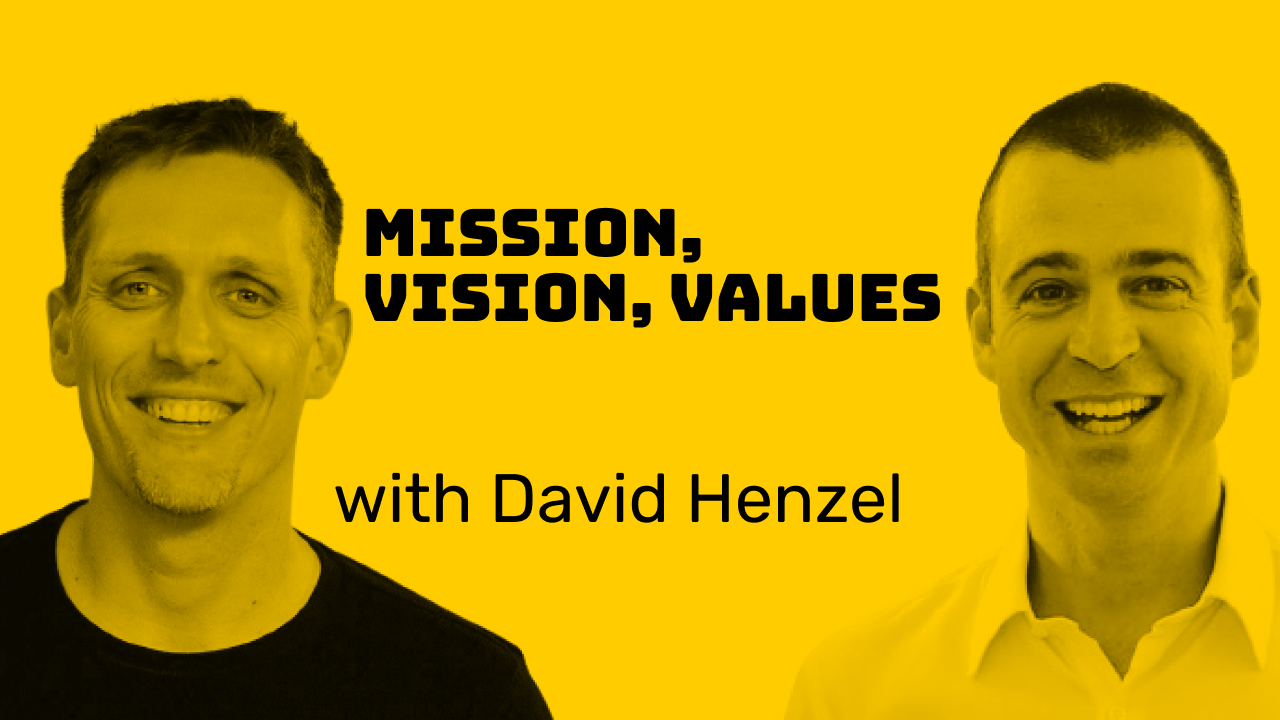
Mission, Vision, Values, David Henzel LIVE | STRATEGY SPRINTS 196
In this episode, Simon welcomes -David Henzel. David is the chief executive officer of UpCoach, which is an online coaching platform that allows coacher to scale their coaching online with the platform built for group coaching. It also enables coacher to create structured group coaching programs, monitor key client metrics, behavior changes, and communicate with all their clients in one focused online group coaching platform. David also has a small portfolio of companies including LTVplus, (Outsourcing for e-commerce & saas), TaskDrive (Sales Development), Shortlist.io (Digital Marketing Agency), and his passion project Managing Happiness (Peak Performance Group Coaching for entrepreneurs). Let’s listen to David’s sharing on Mission, Vision and Values.
3 Valuable Insights:
- Have your own core values inside your mind
- Increase shareholder value
- Remove the limiting beliefs
Our Mission is to empower coaches to spread their teachings to more people with less effort so millions can reach their full potential.
(00:00) -Simon: Three, two, one. Roll the footage.
(00:14) -Simon: Welcome back to the Strategy Sprints podcast. I'm your host Simon Severino. And my guest today is the CEO of upcoach and an experienced entrepreneur who has been building in the SAS and e-comm space for over 20 years. He had multiple exits, including max CDN. He runs a full portfolio of companies and his passion is to help individuals and their organizations reach their full potential. Welcome everybody, David Henzel.
(00:44) -David Henzel: Thank you very much for having me on.
(00:46) -Simon: David. So cool to have you here, and we will discuss how to make the right decisions, how to make them out of love, not fear and how to become the best possible sales person. Super relevant. I have my notes and I'm excited, but first, what are you currently creating?
(01:06) -David Henzel: I'm currently creating up coach, as you mentioned. Um, you know, I have this portfolio of businesses and I want to coach the leadership teams of my businesses, so there to make sure they're on their personal a game. And I couldn't find a software that was doing what I want to do. Um, and so I started building my own solution and then I showed it to, um, Todd Herman, a friend of mine, who's a very well-known coach. And he said, this is amazing. You know, cause I'm not a coach by trade. I've just been doing this. And he was like blown away by the software. And he said, I want to invest and grow the speak together. And this is what I'm creating right now. It's a software that helps cultures to deliver better results, to save them a lot of time and to run their coaching business. And that's, I'm pretty excited about, so it's a very much in line with my personal mission. So having a lot of fun with this
(02:01) -Simon: Beautiful. And uh, your first COTP is decisions should come out of love, not fear.
(02:11) -David Henzel: Yes. That sounds very hippy. You know, you've got, you know, I have a meditating frog behind me, so I am pretty hippy I guess, but, uh, it's actually, you know, th the love and few thing has a place in business and, and, and life. Um, I used to be very introverted. I call myself a recovering introvert and, uh, this was like really holding me back in, in, in my entrepreneurial journey or also in general in life, because, you know, selling things, something like, I always felt like a used car salesman or like you know, uncomfortable being on conference calls. And, you know, this was like, you know, problematic. So I thought, okay, I want to get rid of this. And I, um, the Toastmasters and I went to a lot of sorts of networking events to just overcome this fear. And at some point through exposure therapy, I kind of overcame this, but then the real change happened when my yoga teacher said every decision life you had to make out of love for other fear.
(03:00) -David Henzel: And this was something I always knew deep down inside, but I could not articulate. And once you set this, I realized this isn't for example, in sales, if I want to sell you something, and I sell you this product here, because I think it's a really good product in the school to make your life a business better and easier than I can even be a pushy salesman. Cause I'm doing it for you. And I'm doing it out of love because I want to make you succeed. Versus if I'm doing a fear, I just have to have to hit my numbers. I have to pay my mortgage, et cetera. If this is the driver for my decisions, then everything becomes super hard. Same with speaking on stage, being on a podcast, you know, before with four, we saw like, Oh, do they think I have a weird German accent? Do they think I look worried too? I think what I'm saying is stupid, et cetera. And then I freeze and I can't really give a presentation, but if I act of love and I know what I have to say can potentially help you in your life and your business, then I can just roll and present.
(03:53) -David Henzel: I was just thinking about decisions that I took today with my kids at breakfast, you know, making ready for school, et cetera, and going through the decisions. Did I make them out of love or fear that they could be too late, that I could be too late? Or was it love that's strong. Do you have a, some, some examples of recent?
(04:16) -David Henzel: Yeah, sure. I can give you a love from family. You just talked about family. My wife always asks me to do like home improvement stuff. Like, Hey, I bought this thing. Could you put it together with you? Could you hang out this picture? And that always set these things out of fear because I only did it because I didn't want to have a fight with her because I say like, no, I don't wanna do this. And, um, and that only did the mother fear. So now that I'm aware of this love with few things, I still start other fear. Cause I still don't like it. But when I do it, I do the love because I want to make our house nicer and I want to make my wife happy. And um, then all of a sudden this work that I used to hate actually flows.
(04:55) -David Henzel: And the result is much better when you do something with love, you know, when you cook or when you like get any type of job, if you do, if you do it with love, it will be, um, the result will be much better because if it did other fear and just like the like, eh, then the result was kind of. And then my wife was where the other fight with her afterwards, because the work was not up to respect and that made her happy. Or I can give you a lot more examples. For example, my, my assistant at MaxCDN my previous business, we grew really fast and we had a communication problem in the business. You know, it's like we hired a lot of people and you know, a lot of stuff was going on and we thought, okay, an internal newsletter may be a good solution.
(05:32) -David Henzel: So I told her, okay, please go to each department, head, get the updates for the week. We compile this new set aside the other Monday and everything will be good. And every time she came to me, she gave me this newsletter and I had to correct a million things. So it was never good. So I said it, I said like, Hey, listen, you're doing this task out of love and not here. And she said, what the heck do you mean? Then I said, okay, if you will do this other law, if you'd like, do your best to really understand what each department that has to say, even you do your best to understand what a CTO has to say. She was not super technical and you'd compile this in the newsletter. Everybody gets like super amazing benefit out of great information and even has like fun reading it.
(06:08) -David Henzel: Right. Um, then you would do the stuff, but you're doing a few, the only reason why you're doing this, David set, this has to go out at 4:00 PM on a Monday. This is your motivation. And this also really clicked with her. I never had to correct anything and they got better and better and better. And at the end we even had the video newsletter, but Chicago video interviewed everybody like to have some piece, something like really amazing actually. And so, yeah, also with your teams, it's, it's important that you, that they have to drive to, to do other law firms and also hot of service and helping people, casino money is a side effect of providing value. And if you just, you know, if you're like very customer centric and you just want to help people and just your business will be much better off, it's going to be more fun too.
(06:53) -Simon: How do you create the culture in a team that love becomes the main driver?
(07:00) -David Henzel: One thing is how to have the core value. One of our core values is love, not fear. And, um, you know, we really hammer these core values into people's heads. And we do this by, in the, um, when we do a job description, um, we take a little video that describes the job and at the end, um, once somebody applies, then we also send them a video of like our core core values. So they kind of hear this first there. Then when they, um, sign up for the job, the last page is of the contract are our core value, Steph the initial next to each core value. And, you know, say like, if I'm not living up to these core values, I know that this can be a reason for termination or you will be terminated if you don't live up to them. And then we explain every decisions to them, ideally with core values or as a mission and a vision as, as, as a filter.
(07:47) -David Henzel: Um, so, and also every month we do one, um, onboarding call with everybody, all the people that joined the company this month. And we tell them stories about each quarter, like, you know, it's not on your core values, but like mission, vision and our three uniquenesses and other stuff. But we tell them stories on how people in the business are showed up, like showing these core values to in the organization. So they can kind of like, you know, understand this. And then if we have to make any decisions, we also use them as a, as a, as a filter. And then a way to explain why we do certain things. And this has been working pretty well for us.
(08:30) -Simon: Yeah, I read that your award question, who do you peak when everybody's zigging, this person is zagging?
(08:37) -David Henzel: Can we expand this?
(08:39) -Simon: The strategy award question when everybody's zigging, this person is zagging. Who is the person you pick for this strategy award?
(08:55) -David Henzel: I like what, uh, Stephan Spencer, who was also in JVM. I had him on the podcast lately. He, um, cause like the rock star, when it comes to SEO, we wrote your book on SEO, the artifacts, the opera, you that the biggest book that have you ever seen this book?
Simon (09:13):
Yeah, no, I noticed definitely. Yeah, he's great.
(09:16) -David Henzel: It's like, it's this artifice of your book. I read this like maybe 15 years ago. So I'm like, this is the first one it's like this, this, this thick. Um, and I met him a few, few years ago and we became good friends. I had him on the podcast a few weeks ago and um, he all said like, he only focuses on clients now that have impact. You know, I think that's like a very cool mindset of like, you know, having a business that actually has a positive impact. So it's like very choosy with the clients that it takes on. Even like take somebody who's smaller, but has like a mix of positive impact on the world. So I think this is like somebody I'd like to know my weight for, you know, it's, it's a really good strategy to, um, to live by. And, you know, somebody may think like, Oh, that's not a really good business strategy, but if you have read the book called conscious capitalism by John Mackey, he talks about that.
(10:07) -David Henzel: The old way of doing businesses, we have to increase shareholder value. That's the only thing that matters. That's why business exists. But the conscious way of doing business is, um, we have to do good all the stakeholders, you know, basically by employees, by suppliers, by, um, to shareholders, by the environment, by, you know, by being a net positive in the world. And he makes the point that these businesses are actually making more money than the ones who are just like focusing on, um, increasing shareholder value. So that's why I want to give the awards to Stefan because he's, he's awesome. He's, he's living this way, this business.
(10:43) -Simon: Your second CEO tip is how to become the best possible sales person. Can you unpack that?
(10:51) -David Henzel: Yeah. We already talked about the love and fear thing, fear thing, going back to this, and if you really want to provide value to people and you really want to help them overcome what, you know, w what kind of pain points to have, and really, really studying the pain points that they have and providing real solutions for this. I think this is, you know, what we'll give you powers in terms of closing, because people feel that you have this real connection. So you do this because you want to improve their life. And you're just doing this to, you know, make your pockets fatter. And, um, yeah, that's has been working phenomenally well for me.
(11:26) -Simon: The three books that shaped you most.
(11:30) -David Henzel: Number one in business is traction, which is by Gino Wickman. It's the U S the entrepreneurial operating system, uh, which helps to figure out your mission, vision, core values, 90 day plans, if you have the right people in the right seats and, uh, many other things. And it's just phenomenal. If you kind of stick to the special tested framework, how easier would out for me, the second one is, um, called outwitting. The devil by Napoleon Hill, uh, Napoleon Hill is most well-known for think and grow rich. Think of probably a lot of you have a fretless spot, but ultimately the devil was not released until maybe 10 years ago, something like this, uh, because he was scared to release it because it's very critical towards the society church, um, school system, et cetera. So we thought he gets like he would get in major trouble, even killed if you reduce it and talks about he interviews the devil in this book, asking the devil, what does the devil do to make us not reach our goals and what are the devil has? And the biggest tool of the devil has this fear, and that had very profound impact on me. And the last one is the four agreements, uh, which is, um, a book that talks about the agreements that you make with yourself. And to know that you can remove the limiting beliefs and, um, I can also highly recommend psychosis. I had a really profound impact on my life.
(12:53) -Simon: Wow. And yeah. How are your portfolio companies doing, and what's keeping you up at night on that front?
(13:03) -David Henzel: You know, I sleep really well. Actually. I don't sleep a lot. I only sleep like four or five horse, but, uh, I, I sleep really well. So there's like nothing really, that that keeps me up. It's just like all the normal things, you know, like finding new good talent and, um, like hiring is probably like the biggest challenge or task or stuff that takes the most of my time is like hiring really good high caliber people or casino companies are made up of, of people. And if you find like people who are, I have been there and done that, and you only hire people who have like, had, um, you know, we're in this position at a larger business and kind of like take your extend to this point and beyond. Yeah. That's probably like the thing that keeps me busy and text me keeps me up.
(13:52) -Simon: And I guess it's easy right now to find talent. Uh, at least that's what I would expect.
(13:59) -David Henzel: Depends if you, if you're looking for like high level developer, like very skilled developers, you know, it's, it's, it's competitive and it's expensive. Um, but yeah, with LTE plus, and, um, uh, we have a very, very good recruiting team, um, for, for gentlemen positions, but like people in the leadership teams, from our organizations, it's like always like, uh, a challenge to find like somebody who's like a really good fit from a culture perspective and from a, uh, skill principal perspective. So they're really good. People are still hard to find.
(14:34) -Simon: Well, did you recently change your mind about,
(14:38) -David Henzel: Um, I did 75 heart. I familiar with 75 heart. It's a workout program where you work out twice a day for 45 minutes each minimum, and you have one of the workers to be outside. You have to drink four liters of water, one gallon of water per day. You have to take a progress picture and you have to read 10 pages in the book and you have to do this everyday for 75 days. And if you skip one of these things, um, then you have to start over and also it's like, uh, quite the commitment. Then you would think, I guess it's a fitness exercise, but it's actually more of a mental toughness exercise because, you know, kind of like sometimes it's midnight and I haven't done my second workout and it's dark cold answer writing, and I still have to go for a run, you know, or, you know, doing this, this commitments as really made me a lot tougher mentally. And, um, so this was like something that changed my mind quite drastically.
(15:39) -Simon: Cool, yeah. Why, why did you start it in the first place, but how was the decision making process?
(15:47) -David Henzel: A friend of mine knew a bunch of people who've done this, you know, employees, partners, and, um, uh, a friend of mine just like share it, how this has had impacted him. And I thought, okay, it's, it's, it's a cool challenge. And yeah, so it's just kinda kicking the button to do it. Cool. Looking
(16:09) -Simon: Where, where is your business in three years?
(16:13) -David Henzel: Which one? There's a bunch. I think that, you know, for, uh, with, uh, we have a ten-year target with algebra plus and test drive. We want to get to 10,000 employees. I don't think that we're going to get there in, in, uh, in three years, like most of the 10 target, or we were like two and a half years in. So it's maybe the, uh, w we're currently at 300 employees or so grown pretty rapidly right now. So I don't know, maybe it's 5,000 people will be kind of cool. Um, and with up coach, I want to have a massive impact and attract a lot of cultures too, you know? Cause when, when cultures can have a PI will have, if they're more efficient in running their business, they can have a bigger impact on more people. So, um, yeah, cat can't really give you any specific numbers cause we're, haven't really set them yet, but uh, just really massively scaling up cultures. Like my, my, my main priority right now,
(17:16) -Simon: Where can people find more about all your endeavors?
(17:22) -David Henzel: Uh, you can go to our website, David hensel.com and just actually bought hensel.com the domain. So, so let's talk about this. Uh, so, um, so yeah, so once it's released, probably on hensel.com and, um, do you see a list of my portfolio companies? You can always email [email protected] or you can find me on LinkedIn or Facebook. If you just connect with me, I may not accept it, but if you say, okay, I was you what's on Strategy Sprint podcast, then I'll definitely, if you have some context, I'll, I'd love to chat with you. Please reach out.
(17:50) -Simon: Who should be my next guest?
(18:00) -David Henzel: Did you have Stefan on? He's really amazing.
(18:04) -Simon: Stephan Spencer.
(18:05) -David Henzel: Yeah.
(18:07) -Simon: Beautiful. I was on his podcast. He was not here yet, so I will be very happy to have him on the show. Thank you so much, David, for being on the show, sharing your knowledge and about how to make decisions out of love, not fear and how this makes you a better person, a better leader and a better salesperson. And please come back soon.
(18:32) -David Henzel: Thank you for having me
Get our expert sales tips delivered
By submitting you agree to receive our weekly Strategy Sprints Newsletter as well as other promotional emails from Strategy Sprints. You may withdraw your consent at any time via the “Unsubscribe” link in any email or view our privacy policy at ant time.


